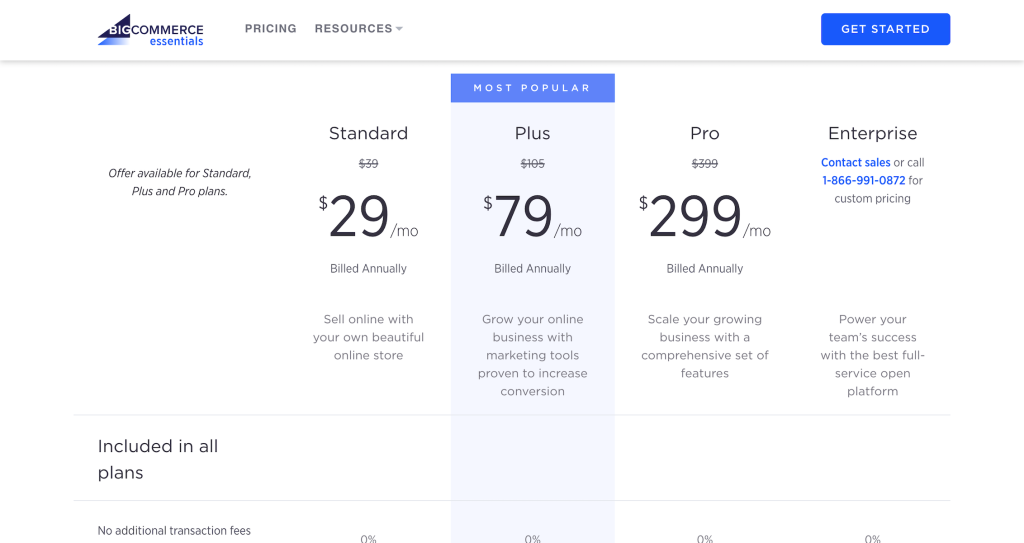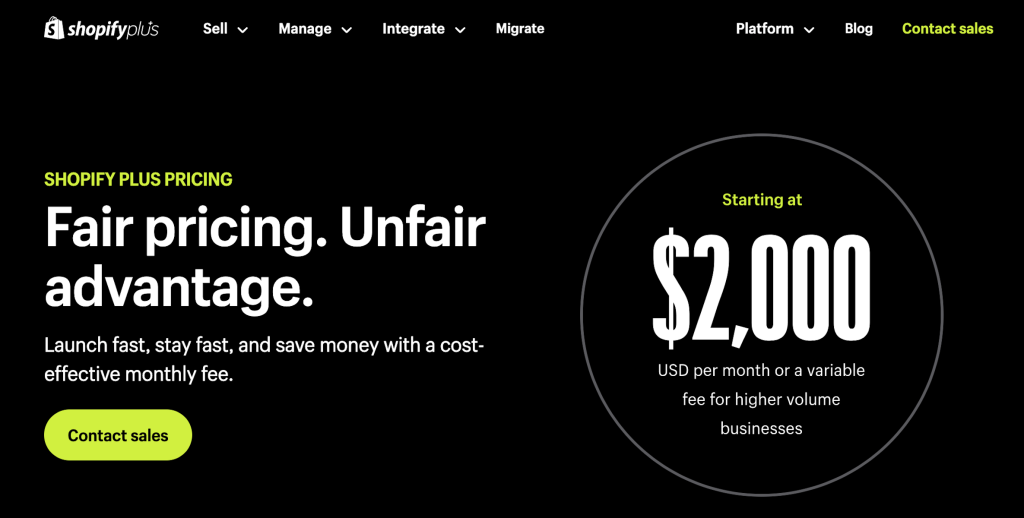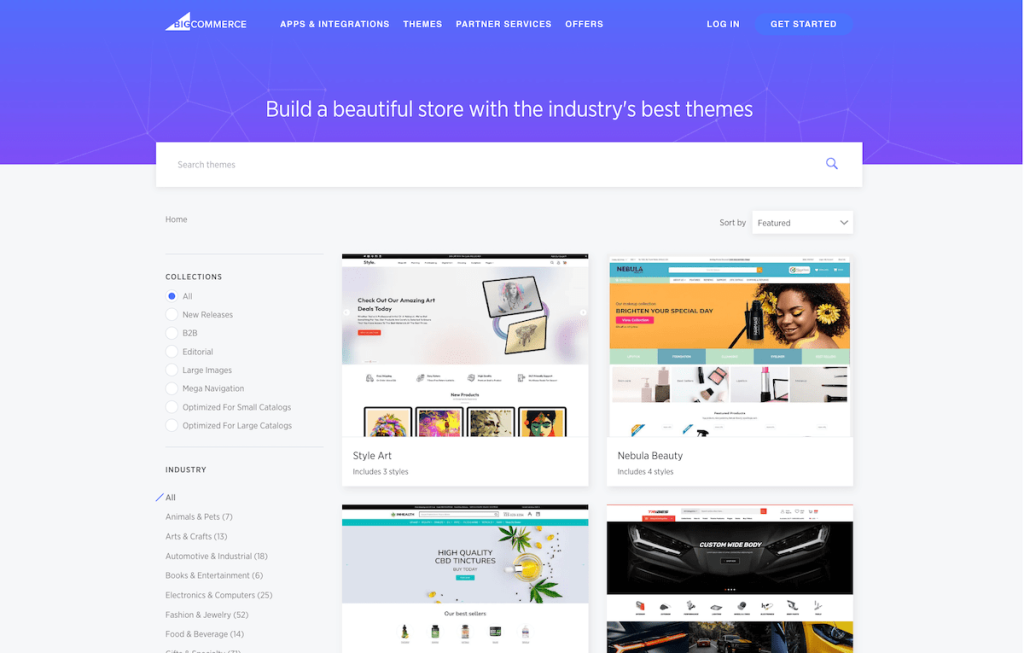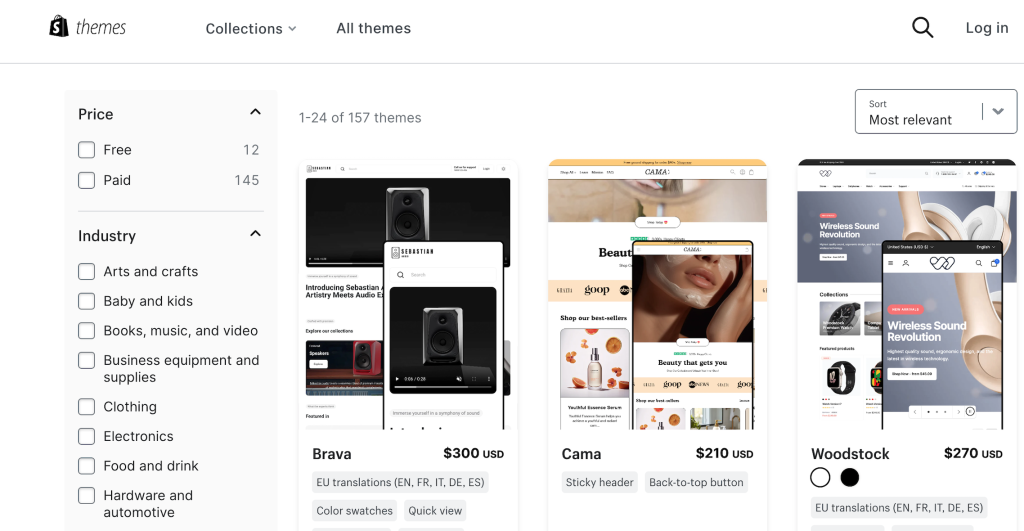As soon as your business starts to scale, sometimes, using your legacy ecommerce platform will feel like shoehorning an oversized foot into a small shoe. At this point, it’s crucial for your project’s success to choose an enterprise platform that can handle the scope of a growing business.
Such ecommerce giants as Shopify Plus or BigCommerce Enterprise can become your fifth element here.
Both Shopify Plus and BigCommerce are top-notch ecommerce platforms that are vastly popular among large brands. Such best-selling projects as Toyota, Gibson, and Ben & Jerry’s use BigCommerce as a platform to run their websites. Similarly, Shopify Plus hosts over 3 million merchants, including top players such as Rebecca Minkoff, LeSportSac, and Fashion Nova.
It’s no wonder quite a few merchants are facing the problem of choosing between those superhero solutions. Naturally, BigCommerce Enterprise and Shopify Plus differ significantly in features and capabilities. Hence, one of them can be more advantageous for some businesses. In other words, to make a rock-solid decision, you need to dig deeper into the specifics of each solution.
If you’re stuck on the fence between these two platforms, you’ve come to the right place. In this article, you will find a lucid comprehension of the solutions to help you make an informative choice between Shopify Plus and BigCommerce Enterprise.
Elogic has expertise in developing 100+ ecommerce projects, and we are ready to share foolproof insights from pros and cons to cost models and features of both ecommerce platforms.
1. Shopify Plus vs. Bigcommerce Enterprise Overview: What’s the Difference?
To give you a head start and a first glance at the main differences between Shopify Plus and BigCommerce Enterprise, we have put together this table:
| BigCommerce Enterprise | Shopify Plus | |
| Launched in | 2015 | 2014 |
| Hosted solution | Cloud-hosted | Cloud-hosted |
| Ease of use | Smooth user experience, intuitive design, advanced support system | Smooth user experience, intuitive design, advanced support system |
| Ease of Integration | native, pre-built integrations that allow you to connect to PIM software, ERP suites, OMS solutions, POS and automated marketing tools straight out of the box | Integrates seamlessly with an existing tech stack, including ERPs and PIMs. Limited to Shopify API |
| Extensions | 1,000+ | 4,000+ |
| Price | Starts at around $400 a month, and can range anywhere up to $20,000 per month | Starts at $2,000 per month. |
| Themes available | 170 themes in total | up to 100 themes |
| Features | Wholesale channel, omnichannel, automatically generated sitemap,social media integrations, unlimited staff accounts, headless capabilities, integrations, and more | Headless capabilities and integrations, abandoned cart saver, customer groups and segmentation, google customer reviews, unlimited API calls, social media integrations ,unlimited Staff accounts, and more |
| Payment gateways | Paypal, Stripe, Square, We Pay and Chase Pay. Native integration with VISA Checkout. Paypal transaction fee is 2.9% + 30 cents per transaction | 70+ payment gateways no additional fees for Shopify Payments |
| Fitted for | Enterprise-level businesses | Enterprise-level businesses |
| Safety | PCI compliance, SSL certificates. Advanced security and regular updates | PCI compliance, SSL certificates, regular security updates |
In a word, BigCommerce Enterprise and Shopify Plus are both excellent feature-rich platforms. They are upgraded versions of existing solutions to specifically benefit enterprise businesses with high-volume sales and a vast customer base.
Shopify Plus is generally more expensive than BigCommerce, although it still offers substantial value for the investment. They are close to each other in terms of services and performance, not to say that they don’t have advantages in specific areas.
If you are interested in other platforms comparison, here are our articles on the topic:
- BigCommerce vs Magento
- OpenCart vs Magento
- Magento vs nopCommerce
- Magento vs PrestaShop
- Adobe Commerce vs Shopify
Now that you have a general understanding of the main differences between those two ecommerce solutions, it’s time to take a closer look.
Contact our team to build, optimize and integrate your commerce on any platform!
Consult with ecommerce experts now2. Shopify Plus vs. BigCommerce Enterprise: Detailed Comparison
Moving on to a more in-depth comparison of Shopify Plus vs. BigCommerce Enterprise, let’s start with the price.
Pricing & Costs
Information about Shopify Plus, as well as BigCommerce Enterprise prices, are not publicly available. Keep in mind that prices are negotiable according to your sales volume. Below are the BigCommerce pricing plans, although you’d need to contact the sales team for the explicit information about the enterprise package.

The platform fee isn’t the only spending to consider when planning your budget – you will need a development team to further customize your store. Credit card processing fees of the ecommerce platform are also worth considering.
The starting price of Shopify Plus is $2,000 per month, and it can go up to $40,000 for large enterprise-level projects. After the store’s monthly turnover reaches $800,000, the fee is 0.25% of your revenue. On the other hand, BigCommerce Enterprise pricing ranges from $1,000 per month and can go up to $15,000 per month.

The credit card processing fee of Shopify Plus is lower than BigCommerce. and it’s at around 2.15%. Also, payment gateways other than Shopify Payments require an extra 0.15%.The processing is 2.9% + $0.30 per transaction if you use the default payment method for all BigCommerce plans. Overall, Shopify Plus tends to be slightly more expensive than BigCommerce Enterprise.
Read more: How Much Ecommerce Website Costs: Set the Right Budget for Your Project
Ease of use
Both BigCommerce Enterprise and Shopify Plus ensure a smooth user experience with an intuitive design. If any problem or struggle occurs while managing your website, both platforms have 24/7 advanced support services and access to knowledge centers.
Notably, Shopify gained its popularity for its user-friendliness and ease of use, especially among businesses that do not necessarily have advanced technical expertise. Although BigCommerce Enterprise also strives to provide a trouble-free user experience, Shopify’s reputation for unmatched user experience is a strong factor in its favor.
One thing to consider is that the learning curve for enterprise solutions like BigCommerce Enterprise and Shopify Plus will always be higher than their standard alternatives, Shopify and BigCommerce. Thus, they offer more features that you`ll need to master.
Themes & Design
Fonts, layouts, and color palettes – that’s what makes a first impression. You have one shot to wow them, and you don’t want to miss it with a generic or cliche theme design. So, let’s look at what theme selection Shopify and BigCommerce can offer.
With BigCommerce, you can choose from 170 themes. Most of them have up to four styling options. The themes cost from $150 to $300. If you want to save up, there are also 15 free themes. All of them are customized to go together with various industries, from children’s to beauty products. Also, if you are a fan of some particular style or color combinations for your brand, you can match the visual components of the theme with different styles.

Shopify offers up to 100 themes, including seasonal variations to add to your account. All themes get free updates, so you always have the latest version available. There are 72 paid themes with prices ranging from $180 to $350. Unlike its younger brother, Shopify Plus allows you to customize your themes through code (CSS or JavaScript).

Both platforms have a vast selection of mobile-friendly, intuitive, and responsive themes. The finest BigCommerce themes have all you need to amaze your customers: elegant, clean, contemporary design and highly customizable features. Meanwhile, every Shopify theme meets high standards in terms of user experience, making them remarkably easy to navigate and operate.
Product and Catalog Management
You need effective product and catalog management if you want your online store to thrive. This way, you can ensure consistent customer experience across different platforms and up-to-date assortment information. Both BigCommerce and Shopify allow users to organize, maintain, and update inventory information in online stores. However, each ecommerce platform will offer different options for setting up its product catalog.
BigCommerce has a robust catalog API that allows users to sync large, complex catalogs in no time and sell products on marketplaces and social media. With the BigCommerce API, you can improve your inventory management, sync data in real time, and build custom analytics for your catalog.
Shopify Plus has a bold product catalog that is effortless and intuitive to manage, perfect for SMBs. However, Shopify Plus restricts combinations you can use in product descriptions and has a limit of 100 SKU variants.
Integration
Shopify Plus and BigCommerce have everything they need to stand on their own, although boosting them with integrations can bring your store to the next level. Various integration options of both platforms can be beneficial for B2C and B2B businesses.
Shopify Plus and BigCommerce Enterprise can integrate with a range of systems that allow users to manage their online sales and improve customer experience. Shopify integrates with popular systems like NetSuite, Microsoft Dynamics, Salesforce, and HubSpot. BigCommerce Enterprise offers robust integrations with Akeneo, NetSuite, SAP Business One, Salesforce, and HubSpot.
Payment Gateways
A payment gateway is an essential service that allows ecommerce online stores to securely process transactions and accept various forms of electronic payments. Shopify Plus supports over 70 payment gateways with no additional fees if you choose Shopify Payments.
Conversely, BigCommerce provides a smaller selection of payment gateways. BigCommerce does not support some systems such as Swedbank, SEB, etc. However, there are over 40 payment options available, including popular payments like PayPal, Stripe, Amazon Pay, etc.
Sales Features
BigCommerce Enterprise and Shopify Plus both have reliable features for both B2C and B2B sales, helping businesses meet the needs of retail and wholesale customers. For instance, BigCommerce allows users to set up different customer groups with specific pricing levels. This way, merchants can offer discounted pricing to wholesale customers. Moreover, with BigCommerce, you can customize catalogs and products for different types of customers.
Wholesale customers tend to place large orders. This process can be very tricky and complex. To help B2B customers, BigCommerce provides tools to place bulk orders effortlessly and smoothly. Also, to help businesses manage their sales, BigCommerce has a tool “Minimum and Maximum Order Quantity” to set minimum and maximum order quantities for specific products, ensuring wholesale orders match their stocks.
Like BigCommerce, Shopify allows users to set up customer-specific pricing for different customer groups and set minimum and maximum order quantities for products. The main difference is that, with Shopify Plus, you’ll need to create a separate wholesale channel: it allows users to establish a different storefront with pricing and products specifically for wholesale customers.
Read more:
Marketing Features
Marketing is a fundamental part of any successful ecommerce business. So, let’s look at what tools BigCommerce Enterprise and Shopify Plus provide to help make your website get noticed.
These two platforms have robust PPC tools to make your project visible to your customers.
An excellent functionality of Shopify Plus allows seamless integration with Google Ads and Facebook Ads, enabling you to create and manage PPC campaigns right from the Shopify dashboard. BigCommerce, on the other hand, automatically matches advertising campaigns with relevant landing pages to improve the overall user experience and boost conversion rates.
Any successful marketing team must track the effectiveness of advertising efforts. Hence, both BigCommerce and Shopify provide built-in analytics tools, allowing merchants to monitor the performance of PPC campaigns.
To be ahead of the game, you should choose an ecommerce solution with advanced built-in SEO features. Shopify Plus is not very flexible when it comes to SEO. It allows users to make some changes to meta tags, optimize inventory and product pages. However, with Shopify you can’t make changes to the URL structure.
In contrast, BigCommerce gives website owners full control over their website URLs as well as the ability to modify the robots.txt page.
With BigCommerce and Shopify Plus, you can create sales-driven email campaigns with out-of-the-box automation, email templates, and audience segmentation. Using those features will allow you to reach out to specific groups of customers based on their locations and previous orders.
BigCommerce Enterprise and Shopify Plus offer an abandoned cart saver that sends an automatic email notification to customers who leave the store without checkout. Besides those features, Shopify Plus offers recommended send time to increase the open rate. Also, you can create eye-catching branded emails using a drag-and-drop editor.
BigCommerce and Shopify email marketing allows users to create targeted campaigns to grow sales and retain loyal customers.
In a nutshell, both platforms empower businesses with badass features in terms of marketing. It comes down to what specific tools and functionality are a must for your business needs.
Difficulty of migration
When choosing an ecommerce solution for your online store, it’s critical to consider all the challenges and risks of moving from one platform to another content management system (CMS). Data loss, design inconsistencies, errors, and inefficiencies are some troubles that can occur while re-platforming.
Read also: A Complete Guide to Replatforming Ecommerce Websites: Signs, Steps, Examples, and More
The difficulty of this process will depend on how big your store is, the size of your catalog, the number of implemented product settings, and the capabilities of the new CMS you are switching to.
Both Shopify and BigCommerce provide migration tools and services to facilitate re-platforming. Yet, migrating to such higher-tier offerings as BigCommerce Enterprise and Shopify Plus isn’t a piece of cake. While one cannot definitively say which platform is more difficult to migrate to, both will require a solid preparation process and a qualified execution.
There are several complex steps to take when re-platforming, including data migration, customization, integration with third-party services, content and SEO migration, etc. The best way to re-platform to Shopify Plus and BigCommerce Enterprise is to get in touch with an agency to assist you.
Apps & Scalability
Both platforms have mobile apps available for users to check key performance metrics of their online stores, monitor and update orders, and keep track of the sales performance. However, the BigCommerce mobile app doesn’t allow access to the store editor, while this feature is available on Shopify.
As your business continues to grow, you want your ecommerce platform to adapt and perform effectively to respond to increased demand. Both Shopify Plus and BigCommerce Enterprise high-performance infrastructures are designed to scale according to your needs. Hence, they provide capabilities for online stores to grow with automatic scaling mechanisms, multi-channel integrations, unlimited bandwidth, and more.
Security & Support
No business is safe from risks. Ensuring your ecommerce platform provides strong technical support and solid security is crucial. Hence, it is essential to evaluate security and support services in a head-to-head comparison between Shopify Plus and BigCommerce Enterprise.
With Shopify Plus, you will get 24/7 support from a Merchant Success Manager. You can reach out using several channels like email, phone, and live chat. You can get advice on technical matters and your business strategy.
BigCommerce Enterprise also offers 24/7 technical support. With this platform, you will have a dedicated Premium Account Services team. They will cover all areas, from account management to in-house catalog transfer services. The support from BigCommerce Enterprise isn’t limited to technical issues either; the team is always ready to give a competent recommendation or suggestion to help your business reach its full potential.
BigCommerce and Shopify have a lot of beneficial information in their help centers. The difference is that Shopify provides tooltips on the website dashboard that link directly to the corresponding page in the Shopify knowledge center. The attention to detail and user-centric approach helps Shopify users get a quick grasp on a new solution.
When it comes to security, both Shopify and BigCommerce comply with the Payment Card Industry Data Security Standard (PCI DSS compliant) to protect against credit card data leaks.
Moreover, they have SSL certificates included in all of their plans. With BigCommerce, you can switch to higher-level security with website seals and warranties. It will cost you from $59 to $299.
User Reviews
Both platforms have shown decent performance with overall positive feedback. Shopify Plus has been given 4.8 out of 5 stars. According to users, the main pros of the platform include a user-friendly interface, reliable performance, and extensive customization options. While BigCommerce Enterprise received 4.4 stars out of 5, the main advantages of this solution are its scalability and powerful features.
User reviews can come in handy when evaluating your ecommerce platform options. Yet, consider weighing your options against your functional requirements first, before making a final decision. BigCommerce and Shopify Plus both have strengths that align with various business demands.
Whether you're considering Shopify or BigCommerce, our team of skilled professionals is here to help you make the right choice for your project
Request a consultation nowWhat Is Better for You: Shopify or BigCommerce?
There is no way to pick a winner between these two top-notch platforms. Both platforms offer an excellent suite of features, customization options, and integrations. Choosing the one for your business will require a deep evaluation of both solutions and an analysis of your unique goals and growth trajectories.
Nevertheless, here are the key considerations when choosing between BigCommerce Enterprise and Shopify Plus:
Chose BigCommerce Enterprise if:
- You need a platform that provides flexibility in terms of SEO;
- You offer a wide range of product options and variants, and you need a platform to manage the complexity of your offerings;
- Your business runs in the B2B market and requires extensive B2B features such as customized pricing, bulk orders, customer-specific catalogs, and other B2B-specific features.
Chose Shopify Plus if:
- Your business requires additional design customization to fit your online store to your brand’s identity and aesthetics;
- Your project will benefit from a wide range of apps, integrations, and third-party tools available in the Shopify App Store;
- Your priority is an unmatched user-friendly interface that ensures an effortless and pleasant customer experience.
Using this comprehensive comparison will make the decision-making process more transparent for you. But to make an informed decision, it’s recommended to consult with ecommerce experts. Qualified and experienced professionals are aware of all the nuances of both platforms. The best practice is to hire BigCommerce and Shopify-certified specialists.
Shopify Plus is a powerful and feature-rich ecommerce platform designed to meet the needs of high-volume businesses. However, like any platform, it has certain limitations to consider:
- Cost: This ecommerce platform can be too pricey for smaller businesses with limited budgets.
- Product Variants Limit: Shopify has a limitation on the number of product variants.
- SEO flexibility: Shopify offers some SEO features, but other platforms might provide more control over certain SEO elements. Here, you can read more about Shopify Plus’s capabilities and specifics, as this isn’t a complete list of possible limitations to consider before choosing the platform.
Frequently Asked Questions
What is the difference between BigCommerce and Shopify?
BigCommerce and Shopify differ in price, features available for customization, SEO flexibility, scalability, theme selection, and more. Here, you can compare their feature sets and price plans to decide which one will work for you.
Is BigCommerce compatible with Shopify?
BigCommerce and Shopify are independent ecommerce platforms with specific features, infrastructure, apps, integrations, and extensions. And they aren’t compatible with each other.
What are the limitations of Shopify Plus?
Shopify Plus is a powerful and feature-rich ecommerce platform designed to meet the needs of high-volume businesses. However, like any platform, it has certain limitations to consider:
- Cost: This ecommerce platform can be too pricey for smaller businesses with limited budgets.
- Product Variants Limit: Shopify has a limitation on the number of product variants.
- SEO flexibility: Shopify offers some SEO features, but other platforms might provide more control over certain SEO elements.
Here, you can read more about Shopify Plus’s capabilities and specifics, as this isn’t a complete list of possible limitations to consider before choosing the platform.


